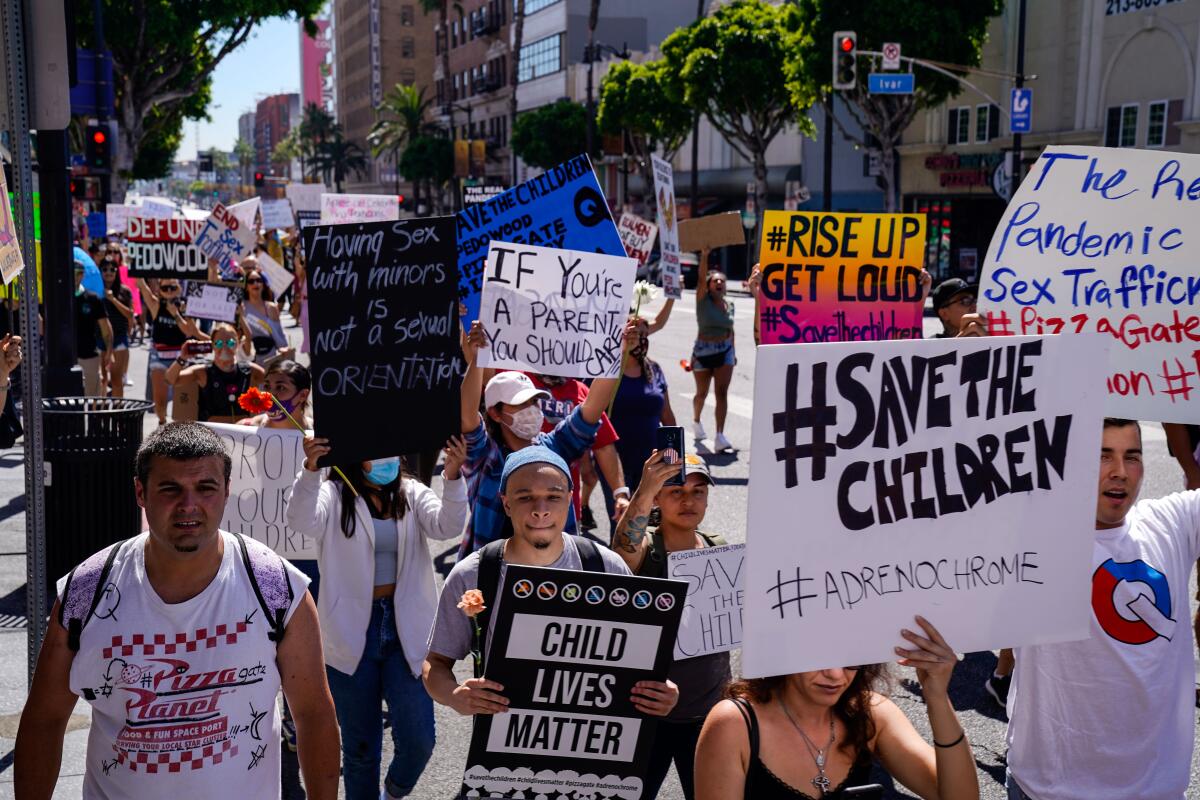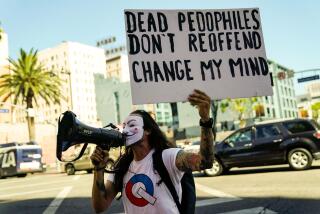Op-Ed: Why fact-checking and reason can’t counteract conspiracy theories or racism

- Share via
Conspiracy theories are brilliant. They really are. In an evil genius kind of way. They tell us so much about humanity’s incredible creative powers. We concoct debilitating and distorted social worlds and then those creations torment us, smothering us as they travel the super-charged speedways of social media.
Some people liken conspiracy theories to superstition, little more than the byproduct of manipulation and soft thinking — mixed with a dash of self-interest. Others might imagine them as a kind of stylized cultural or political critique, a way of articulating dissent far afield from the norms of mainstream public discourse. Conspiracy theories are often absurd, too. Indeed, that absurdity supplies them with some of their power and makes them almost impossible to counteract or cure.
We are awash in conspiracy theories. Whether it’s long-standing anti-vaxxers and current claims that COVID-19 is nothing more than an elaborate planetary hoax, or it’s rumors about antifa members setting those West Coast wildfires or that even President Trump’s COVID-19 diagnosis is nothing more than a political plot, so much of our world is drenched in these kinds of shocking accusations.
Of course, the internet acts as an accelerant in all of this, circulating conspiracy ideas instantly and effortlessly. We know that several QAnon-sympathetic candidates are running for state or federal office this year, and they are winning primaries perhaps as much because of their support of QAnon as in spite of it.
Conspiracy theorizing is also a way of grappling with the anxieties and fears and hatreds that characterize people’s everyday lives. Differences seem scary. Dealing with strangers can be awkward and hard. Demonizing or dehumanizing “others” and “foreigners” often feels simpler.
The same dynamic undergirds racism. It is also fostered by fear and anxiety. More to the point, the very concept of race, the notion that there is some hidden and irreconcilable difference between human groups that we should be afraid of (and that explains everything we need to know about our social world), is itself a form of conspiracy thinking.
Another important commonality between racism and conspiracy theories is that facts aren’t their antidote. Facts don’t change adherents’ minds. At least, not facts alone. This can be especially difficult to recognize for experts and scholars who want to believe that we can fact-check or reason conspiracy theories into submission.
We see this in the unwavering allegiance of always-Trumpers. This isn’t to say that most enthusiastic Trump supporters are conspiracy theorists or racists. Race has long been injected into American political culture. There is nothing new about that. But we have now cultivated a version of partisanship that is based on the same imperviousness to evidence and indifference to facts that energizes all racist commitments and that encourages the wildest of conspiratorial claims.
Something that hasn’t been impervious to change over time is how we act on our anxieties about people’s many differences. In his book “Racism: A Short History,” the historian George Frederickson argues that social differences linked to religious beliefs and cultural practices are fundamentally distinct from fears about differences that get expressed in racial terms. In one instance, nonbelievers are seen as needing conversion, in efforts like the Crusades. In the other, what are considered immutable differences become the rationale for segregation or even extermination, everything from chattel slavery and Jim Crow to South African apartheid. When religious differences themselves are racialized, deemed natural and fixed, conversions get replaced by concentration camps.
There is a reason why anti-Semitism is at the root of every single global conspiracy theory you’ve ever heard, including those espoused by QAnon. Their campaign to “save the children” from Satanists who drink babies’ blood is an extension of centuries-old “blood libel” claims about Jews murdering Christian children to use their blood. And that’s only one example from our current news cycle. A few years ago, I participated in an academic conference at the University of Chicago on conspiracy theories that included participants studying examples from all over the world and from several different eras. I can’t recall a single presentation that didn’t explore links to anti-Semitism, a form of racism. In many ways, the modern conspiracy theory is a specialized extension of racist thinking.
The idea of race paves the way both for real conspiracies — such as “the Tuskegee experiment,” the monstrous clinical study of black male patients left untreated for syphilis in the name of science — and for conspiracy theories like those espoused by QAnon.
Like fact-resistant conspiracy theories, race thinking and racism can’t be easily persuaded away. That’s because these beliefs are as much in our guts as our heads. Facebook can crack down on QAnon posts, as it said it would earlier this month, but such responses may only help to validate the supposed truths of such censored posts for those Facebook users already primed to believe them.
The next time you hear someone proffering a conspiracy theory, which is just about any time you turn on a television or surf the web these days, listen for the anxieties hidden beneath it. Those anxieties are there whether the person is a disingenuous propagandist or a true believer.
Racism and conspiracy theories are never just about those they are meant to demonize (sometimes literally!). They tell us even more about the fears of people who seize upon these unshakable views as ways to hide from bogeymen that they have conjured themselves.
John L. Jackson Jr., an anthropologist and filmmaker, is dean of the Annenberg School for Communication at the University of Pennsylvania.
More to Read
A cure for the common opinion
Get thought-provoking perspectives with our weekly newsletter.
You may occasionally receive promotional content from the Los Angeles Times.










